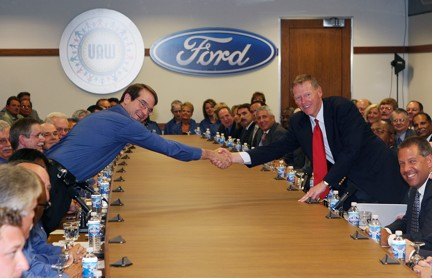Detroit Deathwatch: Outrunning the Bear
In the battle for the American automotive market, Detroit’s fighting for its life, rather than supremacy. The truth is that the so-called domestic automakers are under siege; their non-union competition forced them inside the castle walls a long time ago. And while Toyota, Honda and Nissan are busy unleashing new and improved vehicles to vie for U.S. customers’ patronage, Ford, GM and Chrysler are busy retrenching, regrouping and re-arming, dreaming of both past and future glory. And when they’re not doing that, they’re tearing each other to pieces.
The most recent and obvious evidence of Detroit’s internecine perfidy: Chrysler’s decision to cut 12k jobs, kill models and downsize production just five days after the United Auto Workers (UAW) ratified their new contract. Never mind that the move reveals the UAW’s complete betrayal of their own rank and file, who would have never ratified the Chrysler contract (if indeed they did) if they’d known of the wholesale slaughter to follow. The more important impact of this [necessary] bloodletting will be on Ford.
Now that Ford’s UAW members have witnessed the fallout from the Chrysler contract, they will never ratify an agreement without iron-clad job guarantees. And if you thought that deep-pocketed, privately-owned Chrysler needed a free hand to downsize production, pity poor Ford; the sickest, most vulnerable automaker in the biz. It’s mortgaged up to its eyeballs, losing market share by the minute and drowning in an ocean of red ink. You can see their cash burn from Cincinnati. FoMoCo can afford job guarantees like the average pistonhead can afford a Bugatti Veyron.
Could Chrysler have waited THREE WEEKS before swinging their mighty axe, so that Ford could have secured the same sort of no-strings-attached deal for their UAW members? Sure. And there’s only one reason Chrysler CEO Bob Nardelli didn’t stay his hand: to shiv his cross-town rivals.
If you read the reactions to yesterday’s Ford – UAW deal carefully, you can see the damage the Three-Headed Dog’s automaker has inflicted on The Blue Oval Boyz. "Our goals for this contract were to win new product and investment, to enhance job security and protect seniority,” pronounced UAW Veep Bob King, director of the union's National Ford Department. Yes, well, would the UAW be stupid/brazen/corrupt enough to ask its Ford members to ratify a guarantee-less contract after the Chrysler massacre? Not if you take UAW boss Ron Gettelfinger at his word: "We encouraged Ford to invest in product and people."
In fact, Ford needs to follow GM and Chrysler and invest in getting RID of products and people. They have too many brands, models, employees and production capacity to survive. While Ford’s new union contract includes a huge payment into the UAW’s inconceivably large, eminently lootable VEBA health care superfund– securing the automaker a cost-reducing two-tier wage system– Chrysler has made sure that Ford can’t downsize in time to reap its benefits.
And what of GM? It must be said that GM’s sitting relatively pretty in all this. With the help of the UAW management, they got away with making empty job guarantees to their union workforce (we’ll give plant X the new car– you know, IF there’s a new car). They’re now free to slice production to match demand, and slice they have. Even better, they’re eating Chrysler and Ford’s lunch.
Check out last month’s sale figures. Compared to October '06, GM sales rose by 3.4 percent. Did the market expand? No. Did Toyota, Honda or Nissan sales slip, indicating that The General’s much-hyped new or revised products harvested conquest sales from the transplants? Hell no. The salient stat is that Chrysler and Ford sales plummeted. While there’s no hard data on this, common sense suggests that American car buyers who tend towards domestics (a well-documented predilection) are switching their patronage to GM.
We’ve mentioned that old joke about the “buddies” chased by the bear who realize that they only have to outrace each other to survive. Well, there you go. GM’s in the lead and Chrysler’s tripped Ford. Which is all very well and good for The General and The Dog, but Ford still has a secret weapon (that nobody sees): bankruptcy. While GM and Chrysler have dropped some of their union-related baggage through clever negotiation (i.e. paying off the UAW VEBA-wise), Ford could lighten even more of their load through Chapter 11.
I don’t mean UAW pay or benefits; as [non-co-opted] union members maintain, that’s not the real issue. I mean dealers. All three so-called domestics are hamstrung by their bloated dealer network, which prevents them from consolidating models and killing brands. If Ford files, they can ditch their duff dealers, drop bad brands, beat-up (not remove) the UAW and emerge a far leaner and meaner carmaker than either Chrysler or GM.
Of course, none of this gets rid of the "barbarians" pounding on Detroit's gates.
More by Robert Farago
Latest Car Reviews
Read moreLatest Product Reviews
Read moreRecent Comments
- Kjhkjlhkjhkljh kljhjkhjklhkjh A prelude is a bad idea. There is already Acura with all the weird sport trims. This will not make back it's R&D money.
- Analoggrotto I don't see a red car here, how blazing stupid are you people?
- Redapple2 Love the wheels
- Redapple2 Good luck to them. They used to make great cars. 510. 240Z, Sentra SE-R. Maxima. Frontier.
- Joe65688619 Under Ghosn they went through the same short-term bottom-line thinking that GM did in the 80s/90s, and they have not recovered say, to their heyday in the 50s and 60s in terms of market share and innovation. Poor design decisions (a CVT in their front-wheel drive "4-Door Sports Car", model overlap in a poorly performing segment (they never needed the Altima AND the Maxima...what they needed was one vehicle with different drivetrain, including hybrid, to compete with the Accord/Camry, and decontenting their vehicles: My 2012 QX56 (I know, not a Nissan, but the same holds for the Armada) had power rear windows in the cargo area that could vent, a glass hatch on the back door that could be opened separate from the whole liftgate (in such a tall vehicle, kinda essential if you have it in a garage and want to load the trunk without having to open the garage door to make room for the lift gate), a nice driver's side folding armrest, and a few other quality-of-life details absent from my 2018 QX80. In a competitive market this attention to detai is can be the differentiator that sell cars. Now they are caught in the middle of the market, competing more with Hyundai and Kia and selling discounted vehicles near the same price points, but losing money on them. They invested also invested a lot in niche platforms. The Leaf was one of the first full EVs, but never really evolved. They misjudged the market - luxury EVs are selling, small budget models not so much. Variable compression engines offering little in terms of real-world power or tech, let a lot of complexity that is leading to higher failure rates. Aside from the Z and GT-R (low volume models), not much forced induction (whether your a fan or not, look at what Honda did with the CR-V and Acura RDX - same chassis, slap a turbo on it, make it nicer inside, and now you can sell it as a semi-premium brand with higher markup). That said, I do believe they retain the technical and engineering capability to do far better. About time management realized they need to make smarter investments and understand their markets better.


































Comments
Join the conversation
Okay, wasn't sure where to post this. I wish to submit the following editorial as the next in the series "GM Death Watch". [BEGIN] ============= Today's headline: GM loses $39B in 3Q ============= [END] Sorry, it doesn't meet the 800-word requirement, but there isn't much else to say beyond that one sentence.
I think Geoptf has a point, though I would qualify it a bit. Bankruptcy may be the long term salvation of a company, but it's not an immediate cure-all, for the reasons he stated (I, for one, would be reluctant to buy a vehicle from a bankrupt company unless the warranty was held by a 3rd party that was not in bankrupcty.) What may be more true is that after chapter 11, the bankrupt company would have to spend a few years in the wilderness, slowly and painstakingly rebuilding both their product line and their reputation - think of how International Harvester disappeared for a few years, then came back as Navistar. The critical question, then, for the potentially bankrupt automaker is this: Do they have a few years in which to recover?